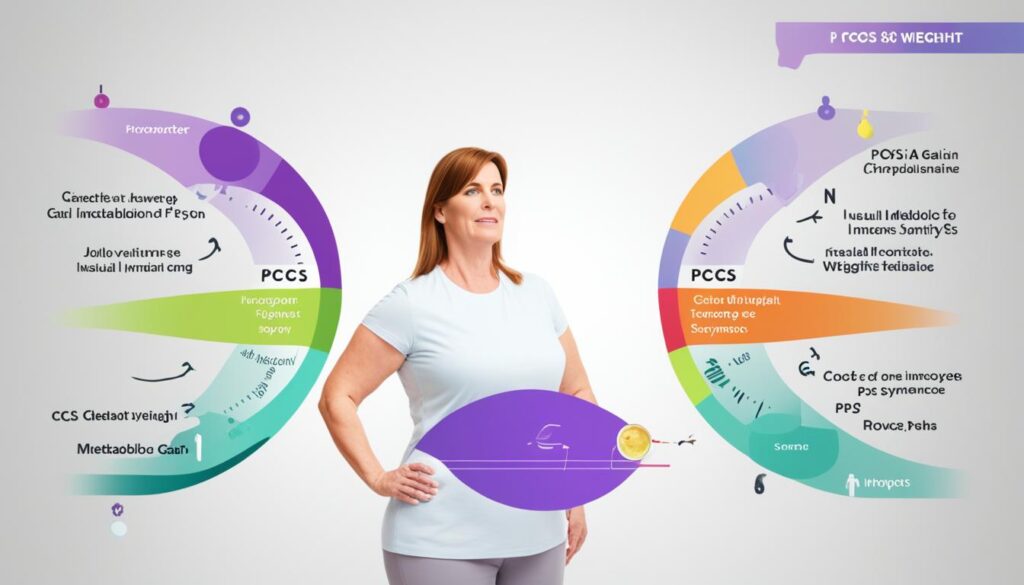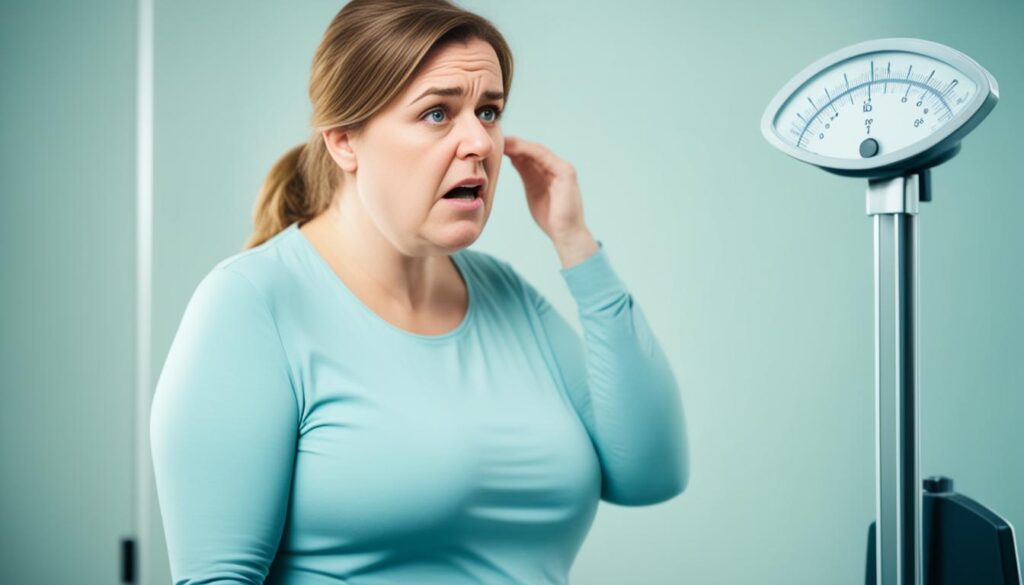I’ve wondered about weight and PCOS often. PCOS is a common hormonal disorder that affects many women. It can make weight gain a big issue, often confusing which problem starts first.
PCOS has many aspects. It includes issues with hormones that can cause different symptoms. Women with PCOS often have more male hormones and insulin problems. These issues can lead to more weight, especially in the belly. This extra weight can make PCOS symptoms even worse, creating a tough cycle.
My research shows that being obese and PCOS are often linked. Women who are very overweight have a higher chance of getting PCOS. But PCOS itself makes it tough to stay at a healthy weight. It’s like a puzzle that many women find hard to solve.
Knowing the link between weight and PCOS is very important. Later on, I’ll look deeper into how weight and PCOS affect each other. I’ll talk about what we can do to help manage these issues better.
The Connection Between PCOS and Weight Gain
Lately, many people want to know about PCOS and how it links to weight gain. This issue is common among women. Knowing this link helps in managing PCOS better.
Defining Polycystic Ovary Syndrome
PCOS is a disorder of hormones in women. It causes problems like not having regular periods. Women with PCOS might have more of a male hormone called androgen. They can also develop small cysts on their ovaries. Many with PCOS also struggle with gaining weight.

Common Symptoms of PCOS
If you have PCOS, you might see:
- Unexplained weight gain
- Acne outbreaks
- Excess hair growth
- Thinning hair on the scalp
- Irregular menstrual cycles
The Role of Hormonal Imbalances in Weight Gain
PCOS and weight gain are closely tied through hormones. Many women with PCOS are resistant to insulin. This leads to the body making more insulin, which can store fat. High androgen can also make you eat more and gather fat around your belly. The mix of these issues makes managing weight hard for people with PCOS.
Does Weight Gain Cause PCOS?

People ask me if getting bigger causes PCOS. The real answer is kinda complicated. Being overweight and PCOS have a tricky connection. Too much weight might make PCOS worse. But, PCOS itself could make you gain more weight.
Science hasn’t exactly said that getting heavier causes PCOS. But being really big increases the chance of having it. If you’re more likely to get PCOS, you might have problems with your hormones and how your body uses food. This could lead to you gaining weight and then maybe getting very big. Then, PCOS symptoms can get even worse.
Here’s what I know about PCOS and weight:
- Insulin resistance can make you gain weight.
- Hormones in PCOS might make losing weight tough.
- Being too heavy can make PCOS harder to deal with.
- Staying at a good weight can help control PCOS.
Even though we’re not totally sure if getting heavier causes PCOS, we do know they’re very tied together. If how much you weigh worries you because of PCOS, it’s really important to talk to a doctor. They can help you come up with a plan that’s just for you.
Hormonal Factors Contributing to Weight Gain in PCOS
I’ve found that PCOS and weight gain often go hand in hand. As someone living with this condition, I understand the frustration of dealing with hormonal imbalance weight gain. Let’s explore the key factors behind this challenging aspect of PCOS.
Insulin Resistance and Its Impact
Insulin resistance is big in PCOS weight gain. Studies show that over half of us with PCOS face this problem. It makes our bodies use insulin poorly, which can make us store more fat. This makes losing weight hard.
Elevated Androgen Levels and Their Effects
More androgens, like testosterone, add to PCOS issues. They can make us hungrier and store more fat around our belly. That’s why many of us with PCOS have a body shape like an “apple.”
Other Hormonal Changes Influencing Weight
PCOS does more than mess with insulin and androgens. It can mess up our ovary job, which might raise estrogen and lower progesterone. This can add to fat storage. Some of us might also have thyroid problems. These can slow down our metabolism, making it harder to manage our weight.
Knowing about these hormonal causes has helped me a lot in my PCOS journey. It’s key to team up with doctors to tackle these imbalances. This can lead to better weight strategies if you have PCOS.
The Impact of PCOS-Related Weight Gain on Health
The link between PCOS and obesity is worrying. People with PCOS often have a hard time keeping a healthy weight. And this goes way beyond just looks.
Carrying extra weight with PCOS can mess with how well your body uses insulin. This might up your chances of getting type 2 diabetes. Because of this, some folks are given a diabetes drug called metformin. It tries to make PCOS symptoms and weight issues better.
Being too heavy can mess with your heart, too. It might make your blood pressure and cholesterol soar. And that’s dangerous for your heart. Plus, PCOS weight struggles can bring on bad feelings like anxiety and feeling really sad.
- Increased risk of type 2 diabetes
- Higher chances of cardiovascular disease
- Fertility issues and pregnancy complications
- Greater likelihood of sleep apnea
- Possible increased risk of endometrial cancer
Here’s the good news – many women are dealing with PCOS just like you. In the U.S., about 1 in 10 women in their baby-making years has it. Knowing these risks helps us make smart choices. We can look after our health and find ways to manage our weight well.
Managing Weight with PCOS: Strategies for Success
Handling PCOS weight can be tough, but it’s doable. Eating more fiber is a top tip for PCOS diet weight loss. Most people in the U.S. only get about 15g of fiber each day. This is way below the goal of 25g for women. A study in 2019 found that more fiber helped lower insulin resistance and reduced body fat for those with PCOS. So, load up on fruits, veggies, and whole grains to up your fiber game.
Trying a high-protein diet can also work wonders. In 2012, PCOS folks on this diet lost almost 10 pounds in 6 months, more than the others. Adding lean meats, fish, and plant proteins to your meals is a good idea. And cutting down on sugary stuff is important. People with PCOS can see their blood sugar and insulin levels go up a lot after eating sugar.
Moving your body is crucial for PCOS weight management. The CDC says doing 150 minutes of exercise each week is good. You can break this up into 30 minutes five times a week. This makes it easier to fit into your schedule. Being consistent with your efforts is key. Also, make sure you get enough sleep (7 hours a night) and handle stress well. If things are really tough, talking to a doctor about medications for PCOS and weight loss could be helpful.
